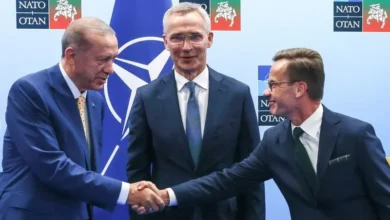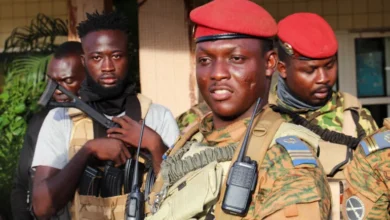Israel debates whether reported strike on Iran was big enough

As Israel maintained official silence on Friday’s retaliatory attack on Iran, its analysts and officials weighed in on whether the scale of the assault was a sign of strength or weakness.
“Iran must understand that when it acts against us, we have the ability to strike at any time, and we can do serious damage,” Eyal Hulata, a former national security adviser, said on Army Radio, shortly after reports emerged that Israel had attacked targets in the Iranian city of Isfahan. “We have a highly capable air force, and the United States is on our side.”
“Weak,” tweeted Itamar Ben Gvir, the hard-right national security minister in the cabinet of Prime Minister Benjamin Netanyahu.
He’s been calling all week for a crushing retaliation to the hundreds of missiles and drones that Iran launched at Israeli targets last weekend, almost all of which were intercepted.
Isfahan has several military bases and facilities and is believed to have been one of several launch sites for Iran’s attack on Israel on Saturday night.
Two US officials confirmed Israel was behind the attack. The Israeli government told officials and embassies not to confirm or discuss the strike, a fairly common practice, according to Israeli officials.
Iranian state media confirmed an attack by Israel involving drones, saying the operation had failed and caused no damage.
Many Israeli analysts emphasized the importance of the loose coalition formed last weekend between Israel, the US, UK, France and regional Arab states that repelled Iran’s missile and drone attack.
It needs to be preserved, they said, so Israel’s response was purposefully limited.
Sima Shine, a former head of research for Israel’s Mossad spy agency, said on Channel 12 that, while narrow in scope, the attack offered a taste of what Israel can do.
Countries across the region and further afield spent the week urging Israel not to react, to “take the win,” as President Joe Biden reportedly put it, regarding the successful defense against the Iranian attack.
Israel is contending with multiple conflicts right now.
About 100 hostages are still being held in Gaza by Hamas, the Palestinian militant group whose fighters swarmed into southern Israel in October, killing 1,200 people and abducting about 250.
The Israeli army is still operating inside Gaza, as well as confronting almost daily attacks from Iranian-backed proxies in Lebanon, Syria, Iraq and Yemen.
Hamas is considered a terrorist organization by the US and European Union and Israel says its goal is to eliminate the group’s leadership and ensure it can never carry out another attack.
More than 33,000 Palestinians have died in the conflict in Gaza, according to the health ministry.
Many of those speaking on Israeli airwaves Friday urged the government to keep its focus on those immediate needs rather than on entering a new, uncharted direct war with Iran.
Few complained, however, about the attack itself or its legitimacy, given the severity of last weekend’s unprecedented direct assault.
Although it caused little damage and no deaths, the potential for casualties and severe destruction was enormous.
Yossi Kuperwasser, a former top military intelligence official, said by phone that while Friday’s counter-attack was limited, “we have to be prepared for any potential reaction, a big one as well.”
“What we have accomplished, assuming it is an Israeli operation, is that we clarified to the Iranians that they are vulnerable,” said Kuperwasser, who is also a fellow at the Jerusalem Center for Public Affairs. “The targets were not far away from nuclear facilities. We can reach those places and cause damage. That’s the message.”
Jonathan Conricus, a former military spokesman now with the Foundation for the Defense of Democracies in Washington, offered a similar analysis, saying on X that: “Iran seeks to return to the shadows and is downplaying the Israeli strike on the strategic city of Isfahan, but I think they’ve gotten the message: Israel can penetrate Iranian defenses and strike wherever it wants.”
Joshua Krasna, a former Israeli diplomat and intelligence analyst, demurred. “We did the bare minimum,” he said in an interview. “It’s not sufficient to close the accounts and move on.”
General Eliezer Marom, a former commander of the Israeli navy, told Channel 12 that if the message isn’t enough, another one will be sent.










